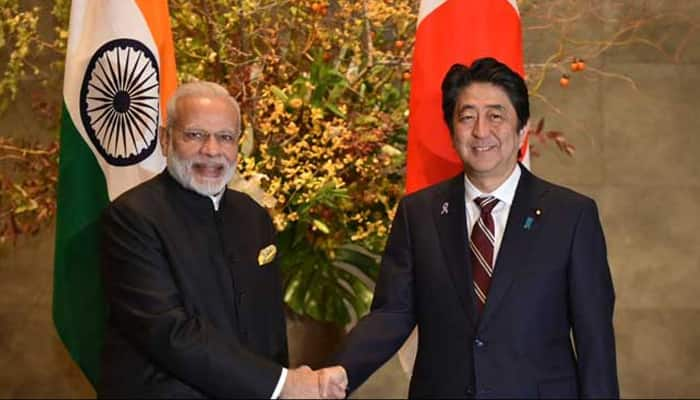Tokyo: India and Japan signed the long-awaited civil nuclear agreement following the annual bilateral summit here on Friday as Prime Minister Narendra Modi wooed Japanese businessmen by reiterating his resolve to make India the most open economy in the world.
"Today's signing of the Agreement for Cooperation in Peaceful Uses of Nuclear Energy marks a historic step in our engagement to build a clean energy partnership," Modi said in a joint address to the media along with Japanese Prime Minister Shinzo Abe after delegation-level talks between the two sides.
"Our cooperation in this field will help us combat the challenge of climate change. I also acknowledge the special significance that such an agreement has for Japan," he said.
Also Read: India becomes 1st non-NPT country to sign nuclear deal with Japan
"I thank Prime Minister Abe, the Japanese government and the parliament for their support to this agreement."
ccording to a joint statement issued after the summit, the two Prime Ministers welcomed the agreement "which reflects a new level of mutual confidence and strategic partnership in the cause of clean energy, economic development and a peaceful and secure world".
The agreement provides for the development of nuclear power projects in India, thus strengthening energy security of the country.
It will open the door for collaboration between Indian and Japanese industries in India's civil nuclear programme.
US firms like Westinghouse and GE Energy, which have significant Japanese investments, will also now find it easier to set up nuclear power plants in India.
Apart from Japan, other countries with which India now has civil nuclear agreements include the US, Russia, Australia, Canada, France, Britain, South Korea, Mongolia, Kazakhstan, Namibia and Argentina.
Stating that India and its economy were pursuing many transformations, Modi in his address to the media said: "Our aim is to become a major centre for manufacturing, investments and for the 21st century knowledge industries. And, in this journey, we see Japan as a natural partner. We believe there is vast scope to combine our relative advantages, whether of capital, technology or human resources, to work for mutual benefit."
Modi said that both sides remained focused on making strong progress on the Mumbai-Ahmedabad high speed rail project.
Japan committed itself to this project during Abe's visit to New Delhi for the annual bilateral summit last year.
Besides the civil nuclear agreement, nine other agreements were signed in areas like skill development, cooperation in the field of outer space, agriculture and food industries, investment in infrastructure projects, textiles, art and culture, and sports.
Modi said that the India-Japan strategic partnership "was not only for the good and security of our own societies", it also brought peace, stability and balance to the region.
"It is alive and responsive to emerging opportunities and challenges in Asia-Pacific," he said.
Modi said that the Malabar naval exercise conducted by India, Japan and the US in June this year "has underscored the convergence in our strategic interests in the broad expanse of the waters of the Indo-Pacific".
"As democracies, we support openness, transparency and the rule of law. We are also united in our resolve to combat the menace of terrorism, especially cross-border terrorism," he stated.
According to the joint statement, both the Prime Ministers condemned terrorism in the strongest terms and "also called for Pakistan to bring the perpetrators of terrorist attacks including those of November 2008 terrorist attack in Mumbai and 2016 terrorist attack in Pathankot to justice".
Stating that India and Japan consulted and cooperated closely in regional and international fora, Modi said: "We will continue to work together for reforms of the United Nations and strive together for our rightful place in the UN Security Council."
He also thanked Abe for Japan's support to India's bid for membership in the Nuclear Suppliers Group.
Earlier on Friday, Modi wooed Japanese investors saying that stable, predictable and transparent regulations were redefining the nature of doing business in India as the country aimed to be the most open economy in the world.
"All of the economic reforms that India is pursuing point into the new direction. My resolve is to make India the most open economy in the world. The impact of our efforts is being felt and recognised globally," Modi said at a business luncheon here, organised jointly by the Confederation of Indian Industry (CII) and Japan business federation, Keidanren.
Modi, who arrived here on Thursday, started Friday by calling on Japanese Emperor Akihito.
This is his second visit to Japan in two years.
















